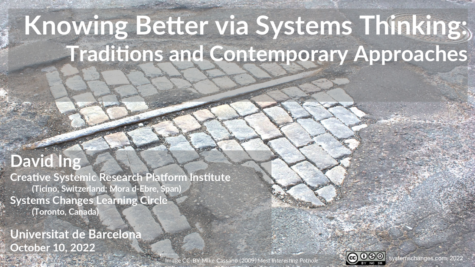Just before starting a trip to Spain, I received an invitation from Ryan C. Armstrong at the Universitat de Barcelona Business School to give some lectures. The students in the bachelor’s programme in international business had a short mention of systems thinking in the first lecture of the operationa management class. With that brief entry, this lecture was an opportunity to introduce a broader view of the traditions of systems thinking, in addition to the practices, theories, and methods under development by the Systems Changes Learning Circle in Toronto.
Having studied business myself at undergraduate and graduate levels, I can empathize with this audience. The essential theme for these students is often: why should I care about systems thinking?; and what is systems thinking?
| A. Knowing better |
| B. Systems thinking (one description) |
| C. Traditions (some favoured) |
| D. Contemporary approaches (in progress) |
| E. Ongoing learning opportunities |
The presentation took about 40 minutes, followed by 15 minutes for questions and comments.
This audio augmented with slides is available on Youtube , as well as on the Internet Archive .
| Video | H.264 MP4 |
| October 10 (54m07s) |
[20221010_UBarcelona_Ing KnowingBetterViaSystemsThinking_HD.m4v] (HD 1280×720 2460kbps 1020MB) [on the Internet Archive] |
| [20221010_UBarcelona_Ing KnowingBetterViaSystemsThinking_QHD.m4v] (QHD 640×360 682kbps 331MB) |
The original audio was processed through a noise gate to remove some echo, followed by an audio compressor.
| Audio | |
| October 10 (54m07s) |
[20221010_UBarcelona_Ing KnowingBetterViaSystemsThinking.mp3] (71.6MB) |
This lecture was at the end of the visit to Barcelona, after the Creative Systemic Research Platform Institute Symposium. Some of the group came in from Mora d’Ebre for a day trip.
Here is the original abstract sent in advance.
Systems thinking can be seen as a superpower that enables individuals and groups to work through wicked messes. Authentic systems thinking has a long tradition in the systems sciences, with variety of schools of thought. Contemporary development of interdisciplinary approaches in the 21st century include service systems science and resilience science. Based in Toronto, Canada, the Systems Changes Learning Circle is contributing new practices, theories and methods in a post-colonial philosophy of science.



